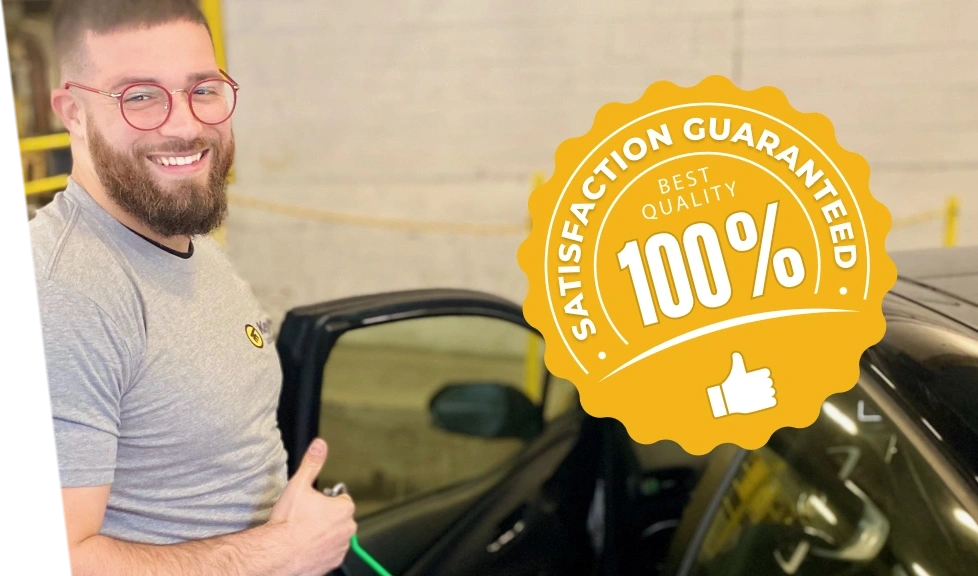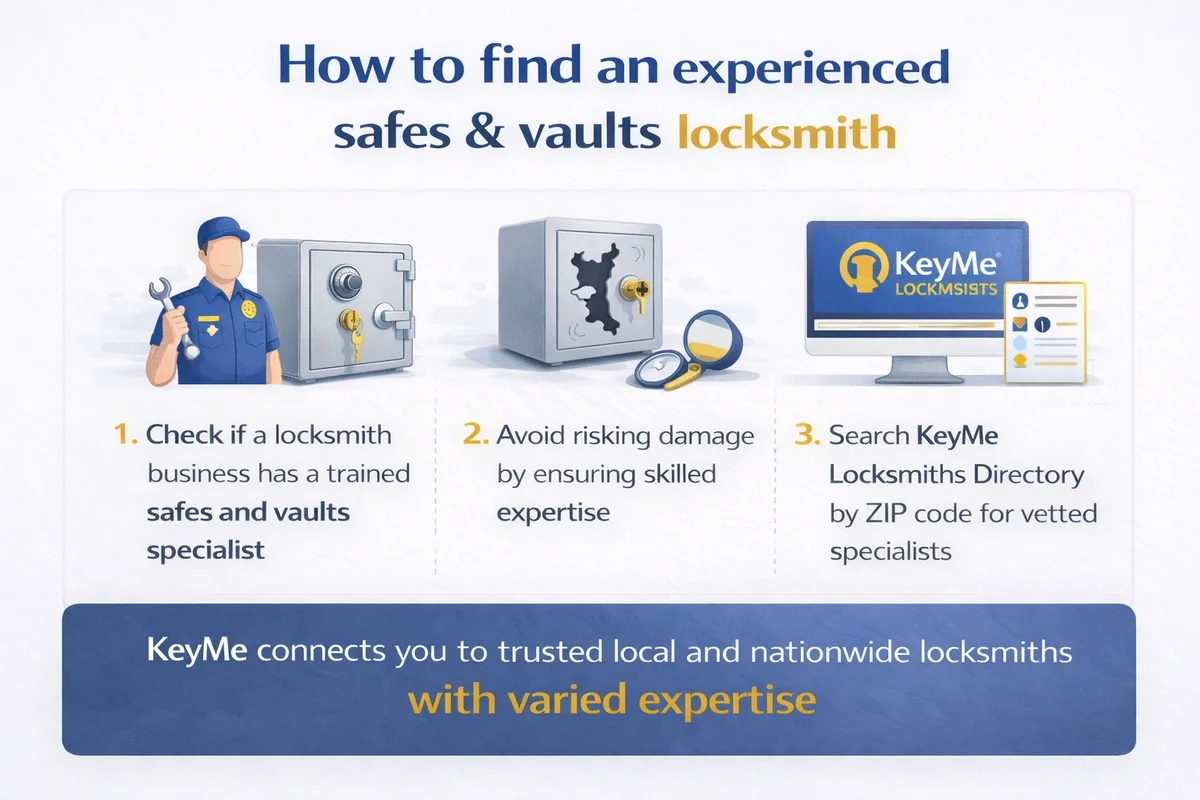Can A Traditional Key Locksmith Crack A Safe?
There are all kinds of instances that might require hiring someone to unlock a safe for you. Perhaps the lock is malfunctioning, you’ve forgotten the combination, or maybe the key has broken in the lock; whatever the cause, you need access to the contents inside.
But who do you hire for the job? Naturally, your first inclination is probably to call a locksmith… but what if your safe doesn’t have a key? Can a traditional key locksmith unlock it for you?
The answer is a definitive maybe.
While a key locksmith may be able to unlock some safes, you’re always better off hiring the most skilled professional possible. Safes and vaults technicians train for years and years to continually better their skills and keep up with emerging technologies in their industry. However, their services don’t usually come cheap. With cost in mind, it’s best to do your homework to determine whether hiring a specialist is overkill for the task.
So, how do you figure out who to call?
When trying to have a safe unlocked it’s essential that you first determine whether you have a true safe or just a lockbox. The two terms are often used interchangeably but when it comes down to it, the devices are really quite different.
“Not every container marketed as a ‘safe’ requires a specialist—but true safes do. The difference comes down to construction and lock complexity, and choosing the wrong professional can permanently damage an expensive unit.” - KeyMe Locksmiths
Safes vs. Lock Boxes
A safe is a container made from reinforced steel and features a built-in combination, electronic, or keyed lock. Safes are designed to be resistant to fire and burglars, and feature locks of varying complexity.
A lockbox, on the other hand, is designed to be easier, and faster, to access. These devices are used to store money, keys (ironically), and sometimes weapons. They are usually armed with a key or electronic lock. Lockboxes are not nearly as sturdy as safes, but still work to make their contents challenging to access.
If your “safe” is really just a lockbox, a regular key locksmith can likely open it for you. However, if you have a traditional safe, it is best to call a safe and vault specialist.
“Safe locks are engineered to resist manipulation, drilling, and forced entry. Even lower-security Group 2 or Type II locks require specialized techniques to open without compromising the safe’s integrity.” - KeyMe Locksmiths
Types of locks
Another deciding factor in whether to hire a safes and vaults technician over a traditional key locksmith is the type of lock.
Whether electronic or combination, the locks on safes are grouped in varying levels of complexity. Group 2 is the lowest security combination lock, and Type II is the lowest security electronic lock.
If you happen to know which group the lock on your safe belongs to it will likely make it easier to find a technician who has the skills to crack it. Be sure to share this information with the locksmith you intend to hire. They should be able to tell you whether they have familiarity with your lock group.
How to find an experienced safes & vaults locksmith
Many locksmith businesses have a trained safes and vaults specialist on staff. If they don’t, they can likely refer you to someone.
If for some reason you’re not sure whether you need a safe specialist it’s best to play it safe and contact one anyway. A traditional key locksmith may tell you they can open your safe, but they may not necessarily return it to you in the same condition it came in.
As the owner of a safe, you know that they’re not cheap, and you don’t want to risk having the safe destroyed in the interest of saving a little bit of money. To ensure your safe (and its contents) remains completely intact, leave it in the hands of a skilled professional.
Your first instinct may be to Google it. However, if you want to find a locksmith by zip code that you know will be reputable and vetted by industry professionals, you can check out KeyMe’s locksmith directory. KeyMe has compiled a list of local and nationwide locksmiths, all with different skill sets. You should be able to easily find one who can help.
Contact the safe company
Finding a locksmith will be much easier if you happen to know the brand of your safe. So another way of finding a key locksmith for your job is to call the company who made the safe and explain that you need it unlocked. They should be able to provide a list of authorized locksmiths who are certified to work with their particular brand of safe. That way you’ll know that your safe is in good hands!
How to ensure the locksmith knows how to properly unlock a safe
Even when speaking with someone who claims to be an expert in cracking safes, you’ll still want to double check. Though, if you’ve been referred to the safe specialist by the company who built the safe, this step is probably not necessary. There are a few questions you can ask the professional to feel out whether they are an actual specialist or just an aspirational key locksmith.
Verify that they are indeed a certified safe technician. Certification is not mandatory, but unless you have recommendations from previous clients or some other evidence that the individual does indeed know how to crack a safe properly, it is best to err on the side of caution.
Ask if they will be able to return the safe to you in good condition. A true safe specialist should be able to crack your safe without doing irreparable damage to the lock or the safe itself. If your reason for hiring someone to open the safe is as simple as forgetting the combination, the specialist should be able to crack it without damaging it at all.
Beware of anyone who gives you a concrete timeline or price. Experienced safe technicians know better than to give out firm numbers. You should expect them to provide an estimate and leave room for variation. Some safes take minutes to open while others may take hours. Quoting a concrete price would be naive.
Don’t hesitate to ask the technician to provide references from former clients as a way of verifying their competence and professionalism.
“A qualified safe technician won’t promise a fixed price or timeline because every safe behaves differently. What they can promise is minimal damage, professional discretion, and respect for the value of what’s inside.” - KeyMe Locksmiths
Locksmith policies on opening safes
Any professional key locksmith will verify ownership of your home or vehicle before unlocking it for you, and the same is true when it comes to opening safes.
Many safes are bolted in place in the home or office of the owner. In these instances, verifying ownership isn’t always necessary because it is implied. That said, the locksmith may still request proof of residence if you are having him work on a home safe.
If you are bringing the safe into the locksmith’s shop, you should be prepared to prove that it belongs to you.
How to prove ownership of the safe
A receipt showing that you were the one who purchased the safe will often suffice. If you are unable to provide physical proof that the safe is yours, the locksmith will ask you questions about why you’re bringing the safe in to be unlocked. He may also ask you to describe the contents of the safe.
These questions are standard protocol to ensure that he does not involve himself in illegal activity. Locksmiths are accustomed to people struggling to prove ownership from everything from homes to cars to safes, and they often have to rely on their intuition to decide whether a person is telling the truth about the situation. If the locksmith senses anything fishy about the job he may refuse to open the safe, and might even contact the police.
Remember, he’s ultimately trying to protect his business and the property of the safe’s rightful owner (even if the owner is you).
Call us if you run into trouble
Can’t find a key locksmith or safe specialist near you? Give KeyMe a call! Our support team is always here to help. Call 855-343-5776 for further assistance.
About KeyMe Locksmiths
KeyMe Locksmiths is a leading provider of local locksmith services and key copy kiosks across 50 states and the District of Columbia. Proud to serve over 5 million customers, KeyMe Locksmiths cuts over 10 million keys annually. With more than 7,500 self-service kiosks in major retailers, an e-commerce platform delivering over 10,000 keys weekly, and a nationwide locksmith network, KeyMe Locksmiths provides fast, reliable solutions for residential, commercial, and vehicle needs. KeyMe Locksmiths is committed to delivering exceptional service backed by a 100% money-back guarantee. KeyMe Locksmiths also operates one of the nation’s leading retail media networks, connecting consumers to other brands seeking to advertise in-store and delivering over 2B monthly impressions.

